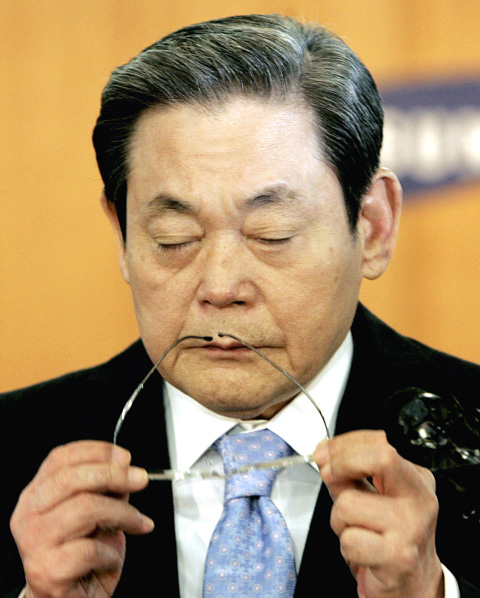Embattled Samsung Group chairman Lee Kun-hee said yesterday he was stepping down from his post at the top of South Korea’s biggest conglomerate following his indictment on tax evasion charges.
“I today have decided to resign from the post of chairman of Samsung,” Lee told a news conference less than one week after he was indicted following a special independent counsel investigation into the conglomerate’s operations.
Lee took over the reins of Samsung two decades ago following the death of his father, the conglomerate’s founder. He is one of South Korea’s richest people and is widely regarded as its most influential business executive.

PHOTO: AP
Samsung Group has interests in dozens of businesses including electronics, shipbuilding and construction. Its companies account for up to 20 percent of South Korea’s exports, some estimates said.
Samsung Electronics, its flagship corporation, is a world leader in computer chips, flat-screen TVs and mobile phones. Lee is widely seen as the driving force behind its rise into a global technology force.
“We, including myself, have caused troubles to the nation with the special probe,” Lee said. “I deeply apologize for that and I’ll take full responsibility for everything, both legally and morally.”
After Lee spoke, vice chairman Lee Hak-soo, considered the chairman’s closest confidante, also announced his resignation as well as that of Lee Jae-yong, the chairman’s son and heir who is an executive at Samsung Electronics Co.
Lee, the vice chairman, said that Lee Soo-bin, chairman of Samsung Life Insurance, would be representing Samsung Group externally. It was not immediately clear if the post of group chairman would remain vacant or eventually be filled.
“I think there will be a pretty serious impact to the group,” Yim Jun-seok, a Samsung spokesman, told reporters after Lee’s resignation. He didn’t elaborate.
Special prosecutors last Thursday indicted Lee on charges of evading 112.8 billion won (US$113 million) in taxes, ending a three-month probe in the family-run conglomerate prompted by allegations of wrongdoing by a former Samsung lawyer.
Prosecutors, however, dismissed the most explosive claim — that Samsung used affiliates to raise a slush fund to bribe influential South Koreans — for lack of evidence.
Samsung Group is characterized by a complex ownership structure based on a web of cross-shareholdings by group companies — some unlisted. Lee’s father founded the conglomerate 70 years ago.
They also indicted Lee without arrest, saying his apprehension was too big a risk for South Korea, citing “the extremely competitive global economic situation.”
Lee hinted earlier this month that he might resign over the scandal following questioning by the special prosecutors.
Besides Lee, nine other Samsung executives were indicted last week.
Samsung also announced it would eliminate its Strategic Planning Office, long a lightning rod for critics who say the conglomerate’s management structure is too opaque.

A Chinese aircraft carrier group entered Japan’s economic waters over the weekend, before exiting to conduct drills involving fighter jets, the Japanese Ministry of Defense said yesterday. The Liaoning aircraft carrier, two missile destroyers and one fast combat supply ship sailed about 300km southwest of Japan’s easternmost island of Minamitori on Saturday, a ministry statement said. It was the first time a Chinese aircraft carrier had entered that part of Japan’s exclusive economic zone (EEZ), a ministry spokesman said. “We think the Chinese military is trying to improve its operational capability and ability to conduct operations in distant areas,” the spokesman said. China’s growing

Taiwan yesterday denied Chinese allegations that its military was behind a cyberattack on a technology company in Guangzhou, after city authorities issued warrants for 20 suspects. The Guangzhou Municipal Public Security Bureau earlier yesterday issued warrants for 20 people it identified as members of the Information, Communications and Electronic Force Command (ICEFCOM). The bureau alleged they were behind a May 20 cyberattack targeting the backend system of a self-service facility at the company. “ICEFCOM, under Taiwan’s ruling Democratic Progressive Party, directed the illegal attack,” the warrant says. The bureau placed a bounty of 10,000 yuan (US$1,392) on each of the 20 people named in

Nine retired generals from Taiwan, Japan and the US have been invited to participate in a tabletop exercise hosted by the Taipei School of Economics and Political Science Foundation tomorrow and Wednesday that simulates a potential Chinese invasion of Taiwan in 2030, the foundation said yesterday. The five retired Taiwanese generals would include retired admiral Lee Hsi-min (李喜明), joined by retired US Navy admiral Michael Mullen and former chief of staff of the Japan Self-Defense Forces general Shigeru Iwasaki, it said. The simulation aims to offer strategic insights into regional security and peace in the Taiwan Strait, it added. Foundation chair Huang Huang-hsiung

PUBLIC WARNING: The two students had been tricked into going to Hong Kong for a ‘high-paying’ job, which sent them to a scam center in Cambodia Police warned the public not to trust job advertisements touting high pay abroad following the return of two college students over the weekend who had been trafficked and forced to work at a cyberscam center in Cambodia. The two victims, surnamed Lee (李), 18, and Lin (林), 19, were interviewed by police after landing in Taiwan on Saturday. Taichung’s Chingshui Police Precinct said in a statement yesterday that the two students are good friends, and Lin had suspended her studies after seeing the ad promising good pay to work in Hong Kong. Lee’s grandfather on Thursday reported to police that Lee had sent